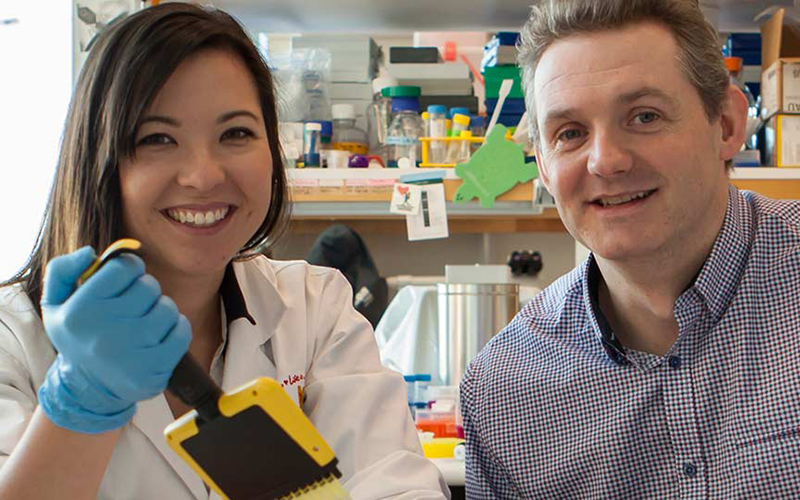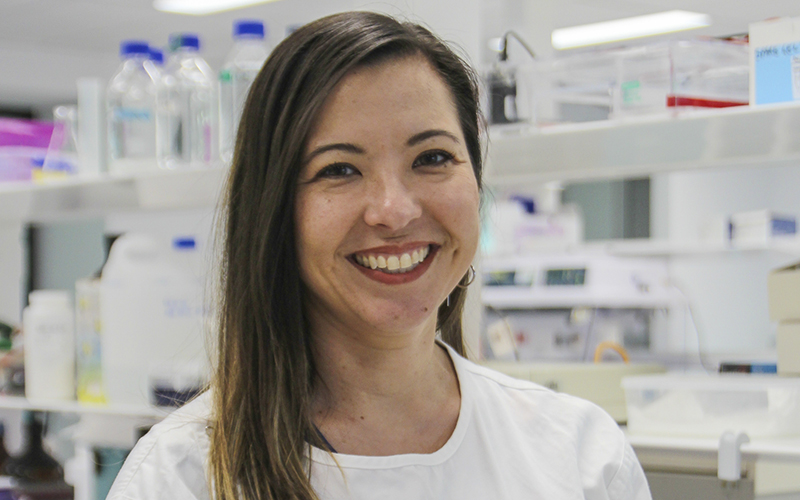Search

News & Events
Landmark research hopes to increase survival rates for aggressive childhood cancerA new combination of drugs could help to increase survival rates with fewer side effects for some children with one of the most aggressive forms of childhood brain cancer.

News & Events
Cancer Council WA supports development of less toxic treatments for childhood brain cancerThe Kids Research Institute Australia researcher, Dr Raelene Endersby, will work to develop less toxic treatments for children with brain cancer, thanks to support from Cancer Council WA.
Research
Veliparib Is an Effective Radiosensitizing Agent in a Preclinical Model of MedulloblastomaMedulloblastoma is the most common malignant childhood brain tumor, and 5-year overall survival rates are as low as 40% depending on molecular subtype, with new therapies critically important. As radiotherapy and chemotherapy act through the induction of DNA damage, the sensitization of cancer cells through the inhibition of DNA damage repair pathways is a potential therapeutic strategy.
Research
A surveillance clinic for children and adolescents with, or at risk of, hereditary cancer predisposition syndromesHereditary cancer predisposition syndromes (HCPS) account for at least 10% of paediatric cancers.1 Li‐Fraumeni syndrome (LFS) is a dominant HCPS caused by mutations in the TP53 gene and is associated with an 80–90% lifetime risk of cancer, commencing in infancy.2 Children of affected individuals are at 50% risk of inheriting the family mutation.
Research
Histone methyltransferase PRDM9 promotes survival of drug-tolerant persister cells in glioblastomaChemotherapy often kills a large fraction of cancer cells but leaves behind a small population of drug-tolerant persister cells. These persister cells survive drug treatments through reversible, non-genetic mechanisms and cause tumour recurrence upon cessation of therapy. Here, we report a drug tolerance mechanism regulated by the germ-cell-specific H3K4 methyltransferase PRDM9.
Research
IDH mutant high-grade gliomasGliomas are the most common type of malignant primary central nervous system (CNS) tumors, resulting in significant morbidity and mortality in children and adolescent and young adult (AYA) patients. The discovery of mutations in isocitrate dehydrogenase (IDH) genes has dramatically changed the classification and understanding of gliomas. IDH mutant gliomas have distinct clinical, pathological, and molecular features including a favorable prognosis and response to therapy compared to their wildtype counterparts.
Research
Long-Term Outcome of Young Infants With Suspected Neuroblastoma following Observation as Primary Therapy: A Report From the Children's Oncology GroupSeveral studies have established that patients with localized perinatal neuroblastoma can be safely observed; however, long-term outcomes have not been previously reported. We evaluated long-term outcomes of infants with suspected perinatal neuroblastoma enrolled on the Children's Oncology Group ANBL00P2, which included an expectant observation approach.
Research
Current gaps in knowledge and future research directions for Aboriginal and Torres Strait Islander children with cancerPaediatric cancer is the leading cause of disease-related death in Australian children. Limited research focuses on cancer in Aboriginal and Torres Strait Islander children. Although there appears to be a lower incidence of cancer overall in Aboriginal and Torres Strait Islander children compared with non-Indigenous children, a high proportion of Aboriginal and Torres Strait Islander children are diagnosed with acute myeloid leukaemia.
Research
Clinical Characteristics and Outcomes of Central Nervous System Tumors Harboring NTRK Gene FusionsTropomyosin receptor kinase (TRK) fusions are detected in less than 2% of central nervous system tumors. There are limited data on the clinical course of affected patients.
Research
IDH-mutant gliomas in children and adolescents - from biology to clinical trialsGliomas account for nearly 30% of all primary central nervous system (CNS) tumors in children and adolescents and young adults (AYA), contributing to significant morbidity and mortality. The updated molecular classification of gliomas defines molecularly diverse subtypes with a spectrum of tumors associated with age-distinct incidence.
